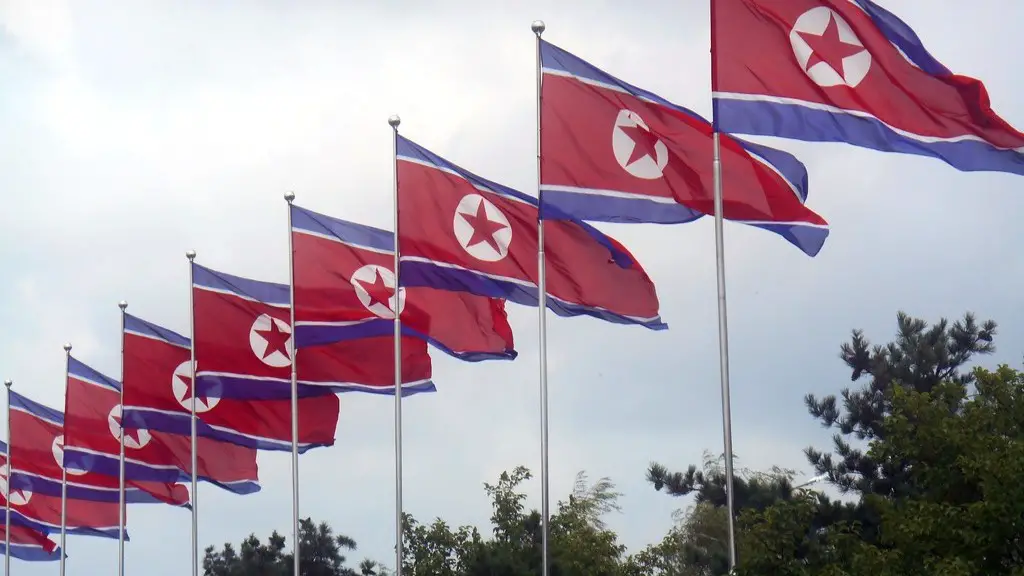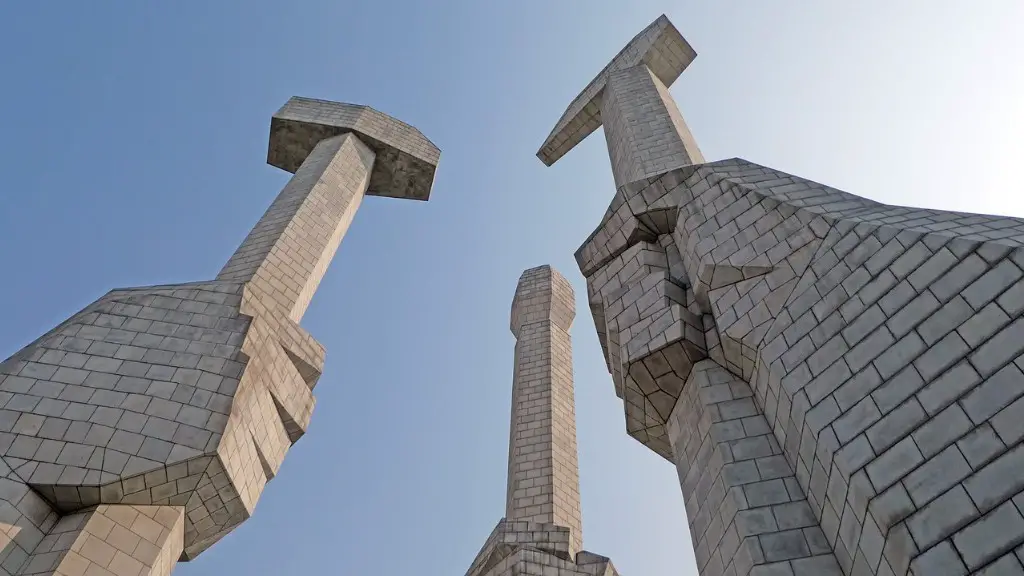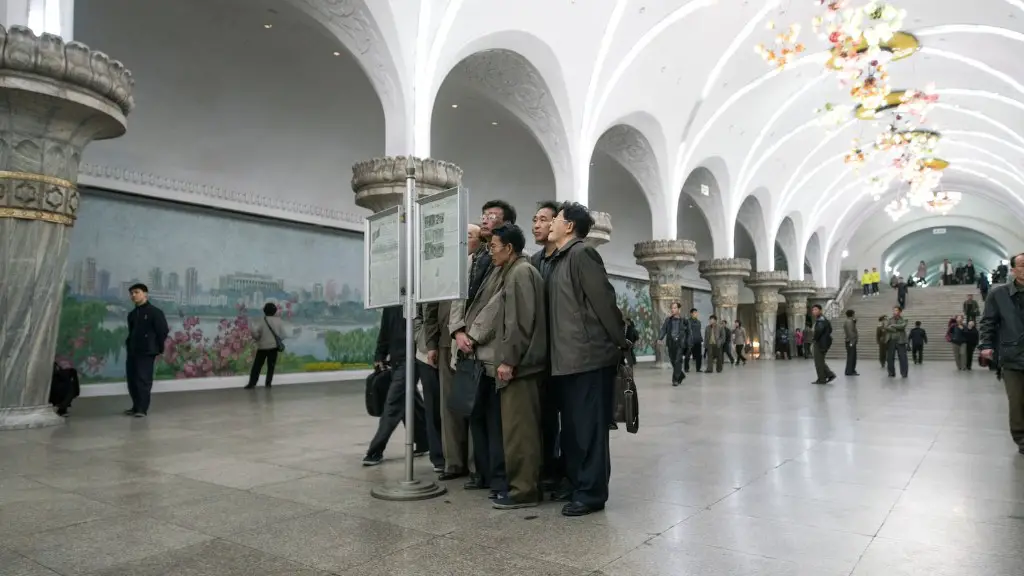The Geopolitical Position of North Korea
When looking at a map, it can be difficult to identify the location of North Korea. It is nestled between China and South Korea, which can be confusing to most map viewers. However, with a little bit of research and exploration, it is possible to find this reclusive and mysterious country on a world map.
North Korea, officially the Democratic People’s Republic of Korea (DPRK), has long been an enigma to those outside of its borders. It is the northernmost country on the Korean Peninsula, with its borders reaching the Yellow Sea, East Sea and Sea of Japan. It shares a land border with China and Russia along the Amnok River, as well as a maritime border with Japan, South Korea and China.
The geopolitical position of North Korea is greatly influenced by its turbulent history, a history which in many ways has determined its current standing and position in the world today. Since being divided from South Korea in 1948, North Korea has maintained a fiercely independent stance and steadfastly avoided being influenced and controlled by external forces. This has led to an often acrimonious relationship with its neighbours, especially with regards to trade and diplomatic ties.
Relationships with its Neighbours
North Korea’s relationship with its neighbours can be best described as strained. This is particularly true with regards to its neighbour to the south, South Korea. The two countries have been locked in a state of limbo since the end of the Korean War in 1953. Efforts to reunify the two countries have been unsuccessful and, as a result, there have been multiple incidents of border disputes, arms build-ups and tensions between the two countries in the decades since.
However, North Korea’s relationship with China is more cordial. China has traditionally been North Korea’s staunchest international ally, supporting it through multiple economic and military agreements. China is also seen by many to be the major influence in keeping North Korea in check and maintaining regional stability.
North Korea’s relationship with Japan is also less hostile, although it has often been concerned about perceived biased media coverage from Japan. Japan also remains concerned about North Korea’s nuclear weapons programme, which has always been a source of both tension and distrust between them.
Effects of Sanctions
In recent years, North Korea’s relationship with the rest of the world has been further complicated by international sanctions imposed by the United Nations due to the regime’s nuclear weapons programme. These sanctions have had considerable economic impacts on North Korea, severely hampering its ability to trade and engage with the outside world. This has led to economic hardship and suffering, particularly among the most vulnerable members of the population.
Many of North Korea’s neighbours have attempted to help alleviate this suffering, with South Korea donating aid packages to the North. However, the effectiveness of these efforts have so far been limited. With no sign of an end to the sanctions regime in sight, it is likely that the situation inside North Korea will remain precarious for the foreseeable future.
International Image of North Korea
North Korea’s international image has long been one of intense suspicion and distrust, with the regime viewed as unpredictable, aggressive and hostile towards the outside world. This perception has largely been driven by the country’s nuclear weapons programme, its record on human rights, and its apparent lack of desire for international engagement and trade.
However, in recent years, North Korea’s leadership has made notable attempts to improve its standing among the world’s nations. A number of diplomatic initiatives have been launched, including a historic summit between North Korean leader Kim Jong Un and South Korean President Moon Jae-in in 2018.
Human Rights and the Media
The human rights record of North Korea is a major area of concern for international organisations, with reports of arbitrary deprivation of liberty, torture and other inhumane treatment. There is also limited freedom of information and expression, with the regime’s media presence largely focused on praising the state and delivering propaganda.
The media environment inside North Korea is strictly controlled and censored by the government, with very little access to international media. This has led to a lack of accurate information and knowledge of the country, making it difficult in many ways to understand the full scope and extent of the human rights problems taking place there.
Impact on the People
At the heart of the issues facing North Korea is the impact on its people. Despite the regular flow of international aid, the people of North Korea still endure a difficult existence and continue to suffer from widespread poverty, deprivation and oppression.
The people of North Korea have long been denied the same rights and freedoms that are enjoyed by citizens in other nations, and there appears to be little hope of this situation improving in the near future. This has been further compounded by the long-term effects of international sanctions, which have had a particularly harsh impact on the country’s most vulnerable citizens.
The Way Forward
In order to reduce tensions in the region and create a more stable environment for the people of North Korea, there is a need for greater diplomatic and international engagement with the country. International organisations, such as the United Nations, must be prepared to take more decisive action and take greater responsibility for the rights and freedoms of the North Korean people.
Furthermore, ongoing efforts must be made to improve North Korea’s access to much-needed humanitarian aid, as well as to ensure freedom of information and expression. Only through these efforts can the international community begin to help bring about a better future for the people of North Korea.
The International Community
The international community must also be willing to listen and understand the motivations behind the actions of North Korea’s leadership. It is important to remember that all countries have a right to self-determination, and this must be respected when considering North Korea’s behaviour on the world stage.
This is not to excuse the country’s various human rights abuses, nor its aggressive stance towards its neighbours and other nations. However, it is important to remember that, at the heart of the debate surrounding North Korea, is a nation desperate to chart its own course and carve out an identity of its own.
United Nations Initiatives
One of the most effective initiatives that the United Nations can take is to provide technical and financial assistance to North Korea. This could range from helping to develop the country’s infrastructure, to assisting in the country’s education and health care systems. In addition, the United Nations could support North Korea in negotiating agreements for increased trade and diplomatic ties, both within the region and globally.
The United Nations is also in a strong position to act as a mediator to aid in bringing about a more peaceful resolution to the current tensions on the Korean Peninsula. In recent years, North and South Korea have made some encouraging steps towards reconciliation, such as the 2018 Pyongyang Declaration. The United Nations can provide an impartial platform and play an important role in facilitating further negotiations and future agreements.
Final Thoughts
Ultimately, the future of North Korea rests in the hands of its people and its leadership. It is up to them to take the necessary steps to bring peace, security and stability to the region, and to ensure the country’s re-integration into the international community.
It is also important to remember that, despite the current level of tension and distrust, there remains hope for a better future for the people of North Korea. With sustained international support and increased international goodwill and understanding, a path forward can be forged that will bring about a more peaceful and prosperous future for the nation, its neighbours and its people.


